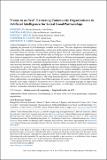"Come to us first": Centering Community Organizations in Artificial Intelligence for Social Good Partnerships
Author(s)
Lin, Hongjin; Karusala, Naveena; Okolo, Chinasa; D'Ignazio, Catherine; Gajos, Krzysztof
Download3687009.pdf (646.0Kb)
Publisher Policy
Publisher Policy
Article is made available in accordance with the publisher's policy and may be subject to US copyright law. Please refer to the publisher's site for terms of use.
Terms of use
Metadata
Show full item recordAbstract
Artificial Intelligence for Social Good (AI4SG) has emerged as a growing body of research and practice exploring the potential of AI technologies to tackle social issues. This area emphasizes interdisciplinary partnerships with community organizations, such as non-profits and government agencies. However, amidst excitement about new advances in AI and their potential impact, the needs, expectations, and aspirations of these community organizations--and whether they are being met--are not well understood. Understanding these factors is important to ensure that the considerable efforts by AI teams and community organizations can actually achieve the positive social impact they strive for. Drawing on the Data Feminism framework, we explored the perspectives of community organization members on their partnerships with AI teams through 16 semi-structured interviews. Our study highlights the pervasive influence of funding agendas and the optimism surrounding AI's potential. Despite the significant intellectual contributions and labor provided by community organization members, their goals were frequently sidelined in favor of other stakeholders, including AI teams. While many community organization members expected tangible project deployment, only two out of 14 projects we studied reached the deployment stage. However, community organization members sustained their belief in the potential of the projects, still seeing diminished goals as valuable. To enhance the efficacy of future collaborations, our participants shared their aspirations for success, calling for co-leadership starting from the early stages of projects. We propose data co-liberation as a grounding principle for approaching AI4SG moving forward, positing that community organizations' co-leadership is essential for fostering more effective, sustainable, and ethical development of AI.
Date issued
2024-11-08Department
Massachusetts Institute of Technology. Department of Urban Studies and PlanningJournal
Proceedings of the ACM on Human-Computer Interaction
Publisher
ACM
Citation
Lin, Hongjin, Karusala, Naveena, Okolo, Chinasa, D'Ignazio, Catherine and Gajos, Krzysztof. 2024. ""Come to us first": Centering Community Organizations in Artificial Intelligence for Social Good Partnerships." Proceedings of the ACM on Human-Computer Interaction, 8 (CSCW2).
Version: Final published version
ISSN
2573-0142